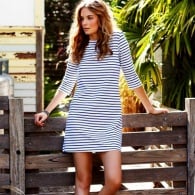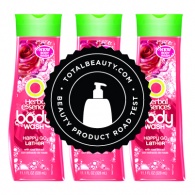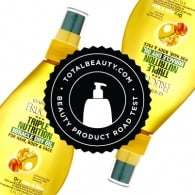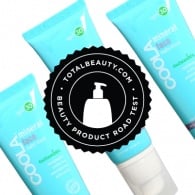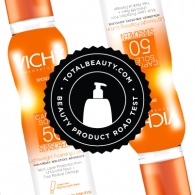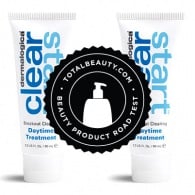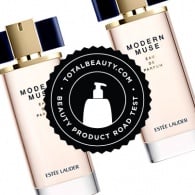So many things about genetics just aren't fair. For instance: My brother has amazingly long eyelashes, while I got stuck with short stubby ones that mascara can barely cling to. Also: Body chemistry. Whereas my friend's chemical makeup makes her smell delicious no matter what fragrance she chooses, when I spray the same perfume on my skin, I smell like I just ran through the woods in the rain ... with a wet dog by my side.
That's what happened on a recent afternoon, when I found myself at a Macy's counter with two friends, sampling Paris Hilton's current best-selling fragrance, "Dazzle," which is described as a "sensual fruity floral" that "toy[s] with the idea of translating the color pink into scent."
I secretly hoard Paris' perfumes (her "Paris Hilton for Women" remains one of my all-time favorite fragrances), so I wanted to love "Dazzle." I even expected to love it after my friend sprayed it on herself and suddenly smelled like a delicious mix of apples and flowers (sort of how I imagine the color pink would, in fact, smell). But when I sprayed it on my wrist, violet petals, peach nectar and orchids did not flood my nostrils, as expected. Instead, all I got was a big whiff of musky cologne -- my least favorite scent of all time.
I walked out empty-handed, feeling disappointed, but also a little bit cheated. What's the deal? How can my friend smell like flowers and apple pie, while I'm left smelling like the aforementioned romp through the woods? And why can't I smell as good as my friend while wearing the same perfume. ... Or can I?
Nosing Around for Answers: The Science of Smell
Enter
Canvas & Concrete's fragrance primer, which landed on my desk soon after my fragrance counter frustration.
What
is a fragrance primer, you might ask. Well, according to Canvas & Concrete COO Adam Hopkins, who helped develop the product, the alcohol-based formula creates a "vapor barrier" on top of your skin that prevents your body's own chemical makeup (read: funk) from messing with the smell of your perfume. The result: the fragrance should smell exactly the same on you (or anyone else for that matter) as it does in the bottle. An unexpected benefit of the barrier, says Hopkins, is that it allows the fragrance to last for a much longer time -- we're talking 24 hours instead of the usual four.
Excited about the possibility of being able to wear any perfume I want without it being tainted by my "funk," I decided to test the primer with one of my old scent fallbacks before rushing out to buy all of my former fragrance counter fails. I notified my coworkers they were on standby as impartial judges, then covered one arm with the primer and a few spritzes of Chanel's "Chance," and the other with just the fragrance, sans primer. I set about having everyone in my vicinity smell my arms ... hourly.
I also reached out to Drom Fragrances perfumer Christopher Diienno to dig into the quirky science of scent, and why I can't smell as good as my friend. According to Diienno, our skin retains and highlights different notes of a fragrance. It seems my skin picked up those notes of "white patchouli" and "crystallized musk," while my friend's skin accentuated the "bright, juicy notes of maraschino cherry and peach nectar" (lucky her).
But ... what makes my skin different from my friend's? Why don't I have the ability to smell like fruits and flowers? Diienno says I can blame my hormones, per usual. Those things are responsible for everything from mood swings to smelling (or not smelling) like a daisy.
"Variables like hormones, body chemistry and hygiene cause an addition to the odor of the fragrance. This may change and is not an inherent function of the fragrance itself." In other words, your perfume and your personal odor (which fluctuates daily according to your hormones -- and showering habits) mix to create your own personal heady cocktail.
On top of that, Diienno said that above all, my brain might be altering the way I smell the scent based on memory:
"Fragrances are meant to tell a story and take you through a journey of memories and emotions. The main defining attribute of a particular scent is how and what it inspires in your memories. If you associate good times or pleasurable events with a particular note or combination thereof, then you will be attracted to that smell."
He suggested that because I associate positive memories with my friend, my scent memory might have been picking up on her natural scent, more so than the perfume itself. Turns out Essence of BFF may have a more positive effect on me than Eau de Paris Hilton.
Sniffing Out the Truth: Testing the Fragrance Primer
The Canvas & Concrete fragrance primer comes in a large, clear spray-nozzle bottle. At first spritz, it smells strongly of rubbing alcohol. That fades after about a minute or so. After letting it dry, you can definitely see that there's something there -- my skin had a gleam to it where the primer landed, and it felt ever-so-slightly tacky to the touch.
Personally, I noticed a difference in the strength of the scent almost immediately. On the arm with the primer, the scent was much stronger. On the arm without, the fragrance seemed to have dissipated, which, after talking with Diienno, I assume is because it mingled with my natural scent. I didn't notice a difference in the actual notes of the fragrance, but that might be because I'm sort of immune to my own natural scent, seeing as I smell like it all the time.
That's why the real test was my coworkers. If they could tell that the scent of one arm was stronger and more true to the bottled fragrance than the other, that would prove that a fragrance primer was doing its job. After wearing the perfume for about seven hours, I got the joy of walking around the office, shoving my wrists under someone's nose, and saying, "Sniff, please."
Everyone could tell a difference between my two arms, but most didn't think the actual scent was all that different. As one person put it, "It smells like a slightly stronger version of the same perfume." What was interesting though, is that the vote was split as to which one was stronger. Half of my coworkers thought my left arm, with the primer, was much stronger, and half thought the right arm, with the fragrance solo, was stronger.
About the arm with the primer, they said I smelled:
"Fresh."
"Like you just got out of the shower." (Thanks, guys.)
About the arm without the primer, they said I smelled:
"Perfume-y."
"Floral."
"Like your own sweet musk." (I think that's a compliment?)
The Verdict
Since we all had (vehemently) different opinions on which arm smelled more "true" to the perfume, it's safe to say that the primer does at least something. I thought it created a longer lasting, more potent version of the fragrance on my own skin. Even at the seven-hour mark, the arm with the primer smelled almost as strong as when I first applied the fragrance, whereas the arm without the primer was just vaguely reminiscent of the fragrance, at least to my nose. Even though some of my coworkers disagreed as to which arm more strongly resembled the perfume, it might have been because of the associations they have with the fragrance or my own scent, as Diienno suggested. Plus, I'm not the type to wear a fragrance because someone else thinks it smells good -- I'm wearing it for myself.
While I kind of like the idea of my own scent mixing with perfume to create a one-of-a-kind signature scent, I can appreciate a perfume that doesn't change based on unpredictable hormones. And, since the primer creates two separate (though similar) scents, it turns that single bottle of perfume into a two-for-one deal. If you have a tough time finding a perfume that smells good on your skin, or if you find yourself reapplying your fragrance every hour, this primer might be worth the investment.



